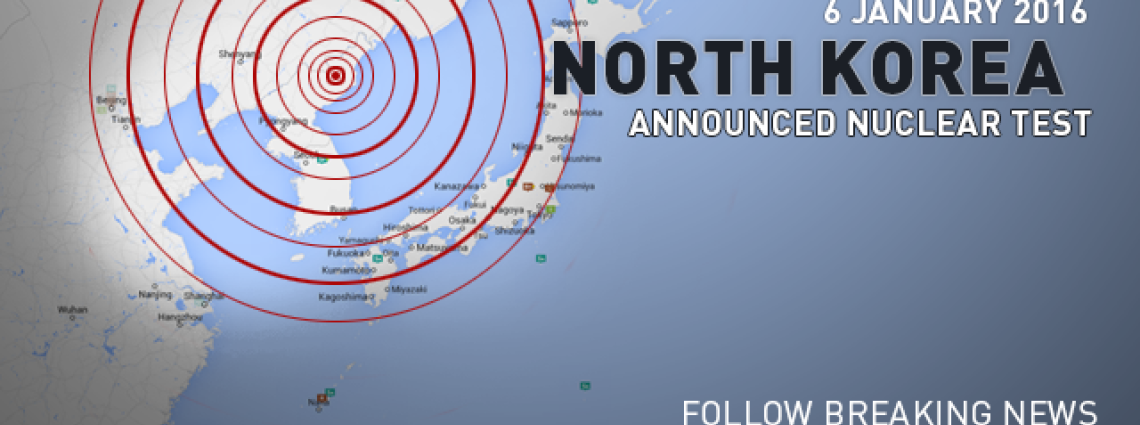CTBTO Executive Secretary Lassina Zerbo on the unusual seismic event detected in the Democratic People's Republic of Korea on 06 January 2016
Vienna, 6 January 2016
“Our monitoring stations picked up an unusual seismic event in the Democratic People’s Republic of Korea (DPRK) today at 01:30:00 (UTC). The location is very similar to the event our system registered on 12 February 2013. Our initial location estimate shows that the event took place in the area of the DPRK’s nuclear test site. The DPRK also claimed today that it has conducted yet another nuclear test, the fourth since 2006.
Our experts are now analysing the event to establish more about its nature.
“If confirmed as a nuclear test, this act constitutes a breach of the universally accepted norm against nuclear testing; a norm that has been respected by 183 countries since 1996. It is also a grave threat to international peace and security. I urge the DPRK to refrain from further nuclear testing and to join the 183 States Signatories who have signed the Comprehensive Nuclear-Test-Ban Treaty (CTBT). As we commemorate the 20th anniversary of the opening of the Treaty for signature, it is high time that the global prohibition on nuclear testing is enshrined into a legally binding instrument. I sincerely hope that this will serve as the final wake-up call to the international community to outlaw all nuclear testing by bringing the CTBT into force,” said Lassina Zerbo, Executive Secretary of the Preparatory Commission for the Comprehensive Nuclear-Test-Ban Treaty Organization (CTBTO).
Broadcast quality footage will be posted in the CTBTO Newsroom as it becomes available.
Background:
The CTBT bans all nuclear explosions. The Treaty will enter into force once signed and ratified by the remaining eight nuclear technology holder countries: China, Egypt, the DPRK, India, Iran, Israel, Pakistan and the United States.
A verification regime is being built to monitor compliance with the Treaty. Nearly 90 percent of the 337 facilities of the International Monitoring System (IMS) are already in place; see interactive map. The system swiftly, reliably and precisely detected all DPRK’s declared nuclear tests. After the previous DPRK announced nuclear test on 12 February 2013, the CTBTO was the only organization to detect radioactivity attributable to the event.
CTBTO Member States are provided with data collected by the monitoring stations, as well as data analyses prepared by the International Data Centre in Vienna, Austria. Once the Treaty has entered into force, an on-site inspection can be invoked in case of a suspicious event. French version
---
For further information on the CTBT, please see www.ctbto.org - your resource on ending nuclear testing, or contact:
Elisabeth Wächter,
Chief of Public Information
T +43 1 26030-6375
E Elisabeth.WAECHTER@ctbto.org
M +43 699 1459 6375
I www.ctbto.org
Thomas Mützelburg, Public Information Officer
T +43 1 26030 6421
M +43 699 1459 6421
E thomas.muetzelburg@ctbto.org
Kirsten Gregorich Hansen, Public Information Officer
T +43 1 26030 6540
M +43 699 1459 6540
E kirsten.gregorich.hansen@ctbto.org
“Our monitoring stations picked up an unusual seismic event in the Democratic People’s Republic of Korea (DPRK) today at 01:30:00 (UTC). The location is very similar to the event our system registered on 12 February 2013. Our initial location estimate shows that the event took place in the area of the DPRK’s nuclear test site. The DPRK also claimed today that it has conducted yet another nuclear test, the fourth since 2006.
Our experts are now analysing the event to establish more about its nature.
“If confirmed as a nuclear test, this act constitutes a breach of the universally accepted norm against nuclear testing; a norm that has been respected by 183 countries since 1996. It is also a grave threat to international peace and security. I urge the DPRK to refrain from further nuclear testing and to join the 183 States Signatories who have signed the Comprehensive Nuclear-Test-Ban Treaty (CTBT). As we commemorate the 20th anniversary of the opening of the Treaty for signature, it is high time that the global prohibition on nuclear testing is enshrined into a legally binding instrument. I sincerely hope that this will serve as the final wake-up call to the international community to outlaw all nuclear testing by bringing the CTBT into force,” said Lassina Zerbo, Executive Secretary of the Preparatory Commission for the Comprehensive Nuclear-Test-Ban Treaty Organization (CTBTO).
Broadcast quality footage will be posted in the CTBTO Newsroom as it becomes available.
Background:
The CTBT bans all nuclear explosions. The Treaty will enter into force once signed and ratified by the remaining eight nuclear technology holder countries: China, Egypt, the DPRK, India, Iran, Israel, Pakistan and the United States.
A verification regime is being built to monitor compliance with the Treaty. Nearly 90 percent of the 337 facilities of the International Monitoring System (IMS) are already in place; see interactive map. The system swiftly, reliably and precisely detected all DPRK’s declared nuclear tests. After the previous DPRK announced nuclear test on 12 February 2013, the CTBTO was the only organization to detect radioactivity attributable to the event.
CTBTO Member States are provided with data collected by the monitoring stations, as well as data analyses prepared by the International Data Centre in Vienna, Austria. Once the Treaty has entered into force, an on-site inspection can be invoked in case of a suspicious event. French version
---
For further information on the CTBT, please see www.ctbto.org - your resource on ending nuclear testing, or contact:
Elisabeth Wächter,
Chief of Public Information
T +43 1 26030-6375
E Elisabeth.WAECHTER@ctbto.org
M +43 699 1459 6375
I www.ctbto.org
Thomas Mützelburg, Public Information Officer
T +43 1 26030 6421
M +43 699 1459 6421
E thomas.muetzelburg@ctbto.org
Kirsten Gregorich Hansen, Public Information Officer
T +43 1 26030 6540
M +43 699 1459 6540
E kirsten.gregorich.hansen@ctbto.org
